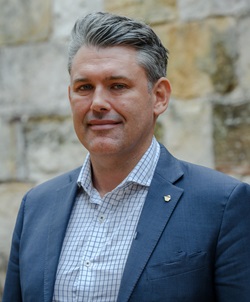2025 | Volume 26 | Issue 4

Associate Professor Anthony Glover
Associate Professor Anthony Glover’s, 2024 RACS John Mitchell Crouch Fellowship is funding research to find new ways to treat advanced thyroid cancer and increase access to new treatments.
A specialist endocrine and surgical oncologist, he says, “receiving this Fellowship is a great honour and valuable opportunity to advance our research in surgical oncology. While these therapies are available globally, access in Australia remains limited.”
A major focus of his research is identifying gene mutations in advanced thyroid cancers and developing targeted therapies. “In the past decade, we’ve gained a much better understanding of the mutations involved,” he says.
For example, some patients with anaplastic thyroid cancer have a BRAF mutation, which previously had no effective treatment. “Now, with targeted therapies like BRAF and MEK inhibitors, some anaplastic thyroid cancers shrink, surgery becomes possible, and we’re seeing long-term survival rates.”
His team is also exploring how to better understand not only the current mutations but also other, as-yet-unidentified mutations that could be linked to treatments producing similar responses.
Building a collaborative network for rare cancers
As advanced thyroid cancer is rare, research is challenged by small patient numbers. “These cancers are difficult to treat, and sadly many patients die or suffer serious side effects,” he says.
To address this, Associate Professor Glover’s team is working with the Australian and New Zealand Thyroid Cancer Registry, based at Monash University, and led by Professor Jonathan Serpell of the Alfred Hospital.
“Our project aims to expand registry participation across Australia and Aotearoa New Zealand to better understand treatment patterns and identify gaps. The team collaborates with clinicians and pathologists—promoting data sharing and improving access to testing and therapies.
“Ultimately, we want to build evidence that supports wider availability of targeted treatments.”
Despite challenges, Associate Professor Glover remains optimistic. “We’re fortunate the registry already includes around 40 hospitals—giving us a strong foundation.”
Standardising molecular testing across centres is challenging, but he says thyroid cancer’s limited mutations allow some flexibility.
“Only a few mutations guide treatment, so not all centres need the same testing.”
Weighing cost to improve access
Given the high cost of targeted therapies, a key component of Associate Professor Glover’s project is evaluating their economic impact.
“Many of these medicines can cost tens of thousands of dollars per patient. We’re trying to assess whether the benefits they provide—longer survival or reduced need for hospitalisation—justify the cost.”
His team is collaborating with health economists to generate cost-effectiveness data that could support future Pharmaceutical Benefits Scheme funding.
“If we can show these therapies are effective and cost-efficient, it could help make the medicines more widely available in Australia.”
From surgery to endocrine specialisation
Associate Professor Glover’s interest in surgery and cancer care began during his internship at St George Hospital in Sydney. He later combined clinical training with research, completing a surgical Fellowship and a PhD in medicine at the University of Sydney.
Based in Sydney, he now balances his endocrine surgery practice at St Vincent’s Clinic and the Kolling Institute with his academic role as Associate Professor at Sydney Medical School.
On RACS scholarships
“I’d definitely encourage applying,” he says. “Research is tough, and competition for grants is high. But rejection is part of the process, don’t be discouraged.”
He credits RACS scholarships with supporting his PhD, postdoctoral Fellowship, and now the John Mitchell Crouch Fellowship.
“We’re lucky to have these opportunities through the College.”
Balancing surgery, research and life
Associate Professor Glover enjoys a varied week, splitting his time between leading Sydney Medical School’s Master of Surgery program, running a research group at the University of Sydney, and his clinical work in endocrine surgery.
Outside of work, he stays active at the beach, where he’s a long-time member of the Palm Beach Surf Club.
“The flexibility of an academic career lets me stay active and spend quality time with my family.”